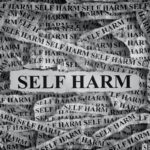Self-harm is not usually an attempt at taking our own life, but a way of expressing deep emotional feelings, such as low self-esteem. It is also a way to cope with traumatic events or situations, such as the death of a loved one, or an abusive relationship. Self-harm is not an illness, it is an expression of personal distress.
Can smartphone apps help female adolescents who self-harm?

Natalie Kashirsky summarises a qualitative study finding that young people think “smartphone apps are cool”, but possibly unhelpful for coping with self-harm.
[read the full story...]








